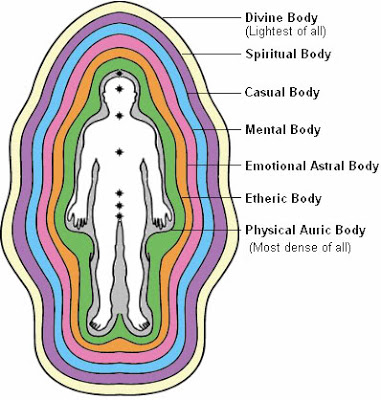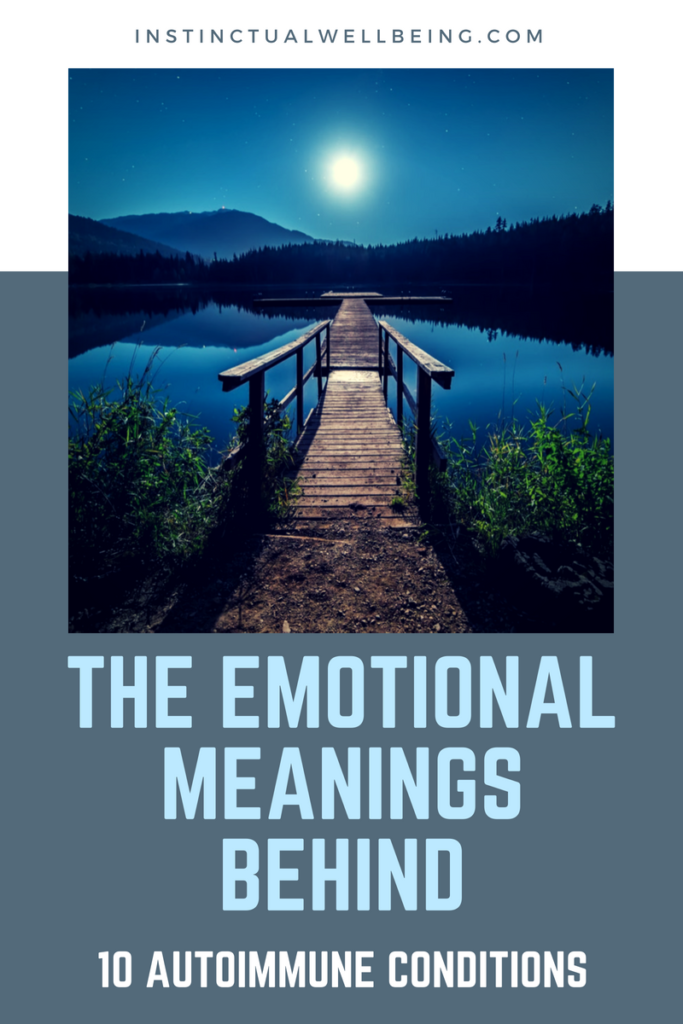It is my belief that a physical showing of symptoms is actually the last stage of the disease process. This obviously contradicts the modern medical system, which holds that symptoms are the first indications of a disease formation. However, in many Eastern traditions, the physical body (the one closest to us) only begins showing symptoms once a disturbance has moved through many different aspects of ourselves, including our emotional and mental bodies, and other subtle bodies that surround us (see below for a depiction of this).
When we understand disease in this way, physical pain or discomfort can mean that the disturbance has already progressed quite a ways, and it is now showing up right in front of us, in need of our immediate attention. This is why I believe understanding the emotional meanings behind illness (or really any physical symptom) is important, as it provides us with a clue about what may really be going on within us. In that way, disease can become our greatest teacher.
I have found that in my own experience, a physical problem will often persist until I am able to learn from what it has come to teach me. Otherwise, it may stick around (or even change form) until I am finally ready to listen and make changes accordingly, or heal whatever truly needs to be healed.
So today I’d like to explore the possible emotional reasons behind 10 of the most prevalent autoimmune conditions. These meanings are a combination of interpretation from the book, Messages From the Body (by Dr. Michael Lincoln), and my own thoughts and insights that have been formed over years of study of Ayurveda, Yoga, and autoimmunity in general.
Parts of these may resonate with you, while parts of them may not, and all of these are just possibilities of what they often mean to the general population. So, I encourage you to read them with open-mindedness. There’s always many influences on a person’s health, so ultimately it’s up to you to interpret and decipher what your illness may be trying to tell you, or what lesson you may need to learn from it. Additionally, these meanings do not discount the fact that your body may have real physical healing that needs to take place!
Interestingly, chances are that if you sit quietly and ask yourself, truly, “What has this illness/ailment come to tell me,” you already know. Ideally though, reading these suggestions will help you gain a general understanding of what the disease could mean, which you can then use as a jumping off point for your own inner exploration.
At the end of the post, I also offer several ideas of what to do with this information once you’ve identified it. I hope this can be a valuable first step on the path of deep healing for you!
Emotional Meanings of Autoimmune Conditions
Hashimoto’s (and disorders of the thyroid)
Problems with the thyroid are often associated with problems expressing one’s truth or with feeling like you’re not being heard. Individuals may feel as if they don’t fit in (“the odd one out”), or like they don’t receive adequate support from those around them. They may also feel unimportant or overlooked, particularly when growing up. Feeling unable to express one’s feelings, or having trouble saying what you need to say.
Rheumatoid Arthritis
There may be a struggle with deep self-dislike, shame and guilt; an extreme form of self-rejection (attacking oneself). Oftentimes these individuals feel a sense of worthlessness and have a high propensity toward self-criticism. With RA, they may be literally preventing movement and fluidity in the direction they’re headed in life, and may feel overwhelmed by the world’s requirements. Unable to release pent-up emotions. Self-sacrificing.
Lyme Disease
Lyme disease can be associated with the need to feel in control of one’s circumstances in every regard, and being a consistent over-achiever. Oftentimes this need for control and high performance rules one’s life, taking the place of vulnerability, intimacy, and emotional commitment. As a result, individuals may feel unsupported, resentful and frustrated. Much of this behavior is said to stem from a “never good enough” parenting situation, where there was a constant feeling of pressure to perform well in order to gain love and approval. As a result, individuals may have a subconscious feeling of self-disgust and lack of self-confidence.
Sjogren’s (dryness of the eyes, mouth, body)
Dry mouth (lack of saliva) is often associated with individuals having a deep disappointment over lack of support and not being able to “tell it like it is.” They may feel as if there’s no such thing as real nourishment. Distrust in the Universe, people, and even new ideas may occur as a result. Dry mouth may also indicate a consistent feeling that something bad is going to happen, so there is anticipation-anxiety and a feeling that you can’t do anything to prevent it from happening.
Dry eyes can indicate being out of touch with one’s feelings (i.e. unable to “shed a tear”). The individual may have turned off all feelings and emotions in response to hurts they have experienced throughout the years. There may be considerable grief and sorrow beneath everything, which is unable (or unwilling) to be accessed and resolved.
Crohn’s Disease
May have trust issues and feel as if nobody can be trusted to do anything for them, and that maybe they aren’t able to get the job done, either. This ties in with a perpetual feeling that they may not deserve support from others as a result of not being good enough.
In Traditional Chinese Medicine, the large intestine is associated with feelings of grief, sadness and loss, so there may also be deeper feelings that are being inflamed by an inability to let go of them and “go with the flow” of life. This is often revealed as the person keeping a strong grip and a “hands-on control” approach to life, where they constantly try to organize and coordinate everything in order to meet needs and demands in the right way.
Psoriasis
Psoriasis, or red, itchy patches on the skin, can represent the individual feeling a constant nagging, irritation or annoyance. This may come from feeling bored from within, or from wanting to achieve something but feeling like they just can’t reach it. They may feel as if they have to settle for putting up with incompleteness.
In a sense, there may be many frustrated ambitions that cause the individual to “gnaw” at themselves at all times, always hoping to achieve something that will gain them final approval and/or validation. Oftentimes this stems from a perception of “never good enough” parenting, where they were blocked from developing their own power and goals.
Celiac Disease
Celiac can mean that there is a sort of “assimilation problem” where the individual is having trouble with processing the things that life throws at them. As a result, there could be a tendency toward responsibility-avoidance and rejecting different aspects of life.
It can also be associated with self-worth issues, where they feel underappreciated and unsure of their capability and value. This can cause the individual to experience shame, guilt, self-doubt or self-image problems.
Fibromyalgia
Fibromyalgia is often associated with pushing oneself to the brink of exhausted or beyond one’s own limits. Individuals may do this because they feel just want to prove that they are good enough. Due to overwhelm and “running on empty,” fibromyalgia can appear.
It can also arise from problems with self-confidence and self-competence, and not believing that one can finish what they start and gain successful results. As a result, there may be a resistance against trying new things or having new experiences. Underlying issues must at last be confronted so that they individual can move on, lest this immobilization continue.
Ankylosing Spondylitis
Feeling as if nobody cares, or as if you are totally alone. This may not always equate to an unsupportive family, but could also be that the individual does not feel as if there is a solid foundation of strength and stability to build upon (which should be provided by a Higher Power). As such, there may be a rejection of support that is offered, as these may seem futile in the absence of having a greater power to sustain them. To compensate for this lack of support from “out there,” they’ve had to become their own pillar of strength.
Ulcerative Colitis
Much like the Crohn’s disease explanation (as they both deal with the large intestine), Ulcerative Colitis can indicate a strong need to have control at all times, which can lead to a tendency toward obsessive-compulsive patterns and an overdeveloped sense of responsibility.
There is also a great need to be loved here, paired with a sort of longing for affection that they may feel as if they didn’t quite experience. There may be a feeling of carrying unnecessary burdens, emotional strain and loneliness.
Individuals with UC may be sensitive, bright, timid, dependent and passive, yet with a strong undercurrent of resentment and anger toward their rigid, patriarchal family and upbringing. Being able to let go and move past these past resentments and oppressions can be key to releasing oneself from emotional burden and moving on from the disease.
Wrapping Up: So What Now?
Again, please understand that these are just some possibilities for what these illnesses could be trying to tell you about your life, or your past experiences. It’s not a definitive list, and some of these explanations may resonate with you while others may not register whatsoever. That’s completely fine!
Regardless, the thing I hope you can gain from this post is an awareness and maybe even acceptance of the fact that illness is multi-dimensional and very complex, caused in varying degrees by physical, mental, emotional, and spiritual pain. I believe that the sooner we can accept these truths and look at our illnesses as messengers, the sooner we can resolve these issues and move into a state of “instinctual wellbeing.”
If an explanation listed here rings true to you and you’d like to explore this further, I’d be more than happy to discuss it further with you in a 1:1 coaching environment, as understanding the emotional aspects and traveling deeper into our diseases is something I work with many of my health coaching clients on.
Another great option would be exploring these patterns on your own. You can journal about what feelings or emotions these brought up for you, past experiences you could connect with your disease, or anything else that comes to mind. The more we can open up to ourselves by exploring the truths of our past and present, the faster we can release any burdens we may be harboring.
I also have a whole list of books that I recommend for “emotional healing,” which can be found on this page. The book, Letting Go Of Shame was a particularly powerful read for me. Seeing as how many autoimmune conditions share a common theme of feeling unworthy or not good enough, I believe that book would be a good starting point for anyone wanting to go a little deeper on this path of emotional healing.
With that, I wish you the best in your healing. And remember, you are powerful beyond all measure and very much capable of healing from within. 🙂





